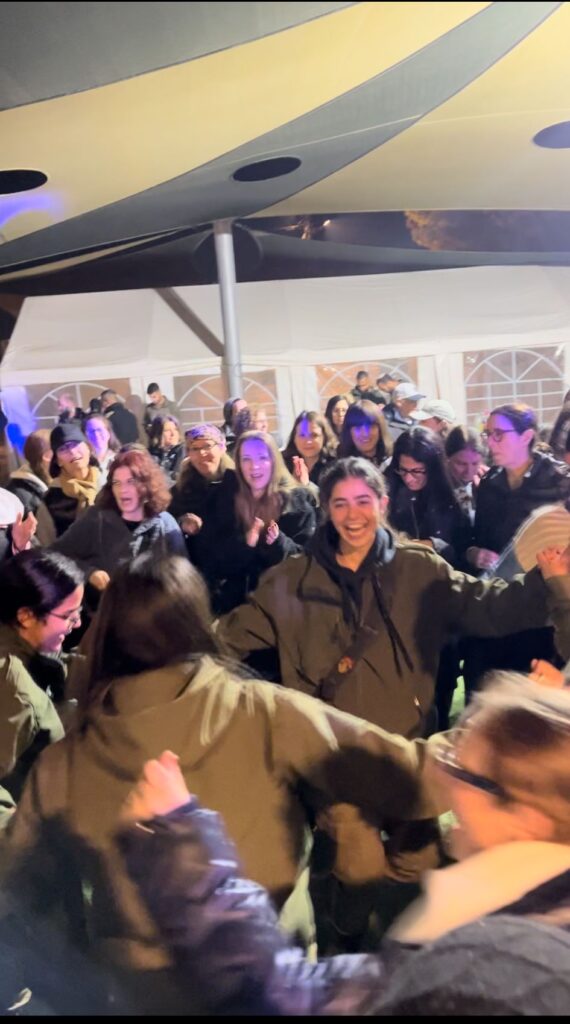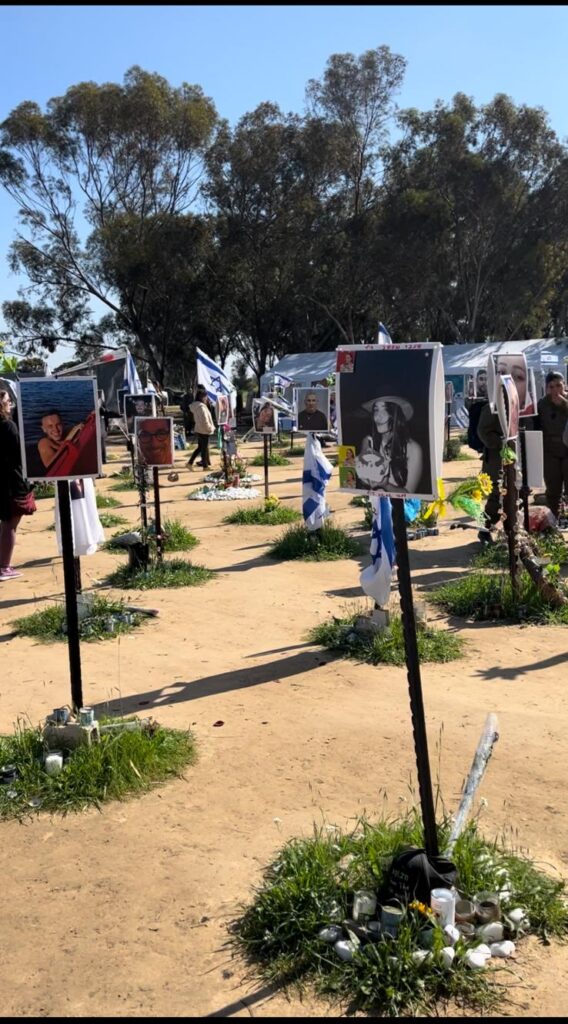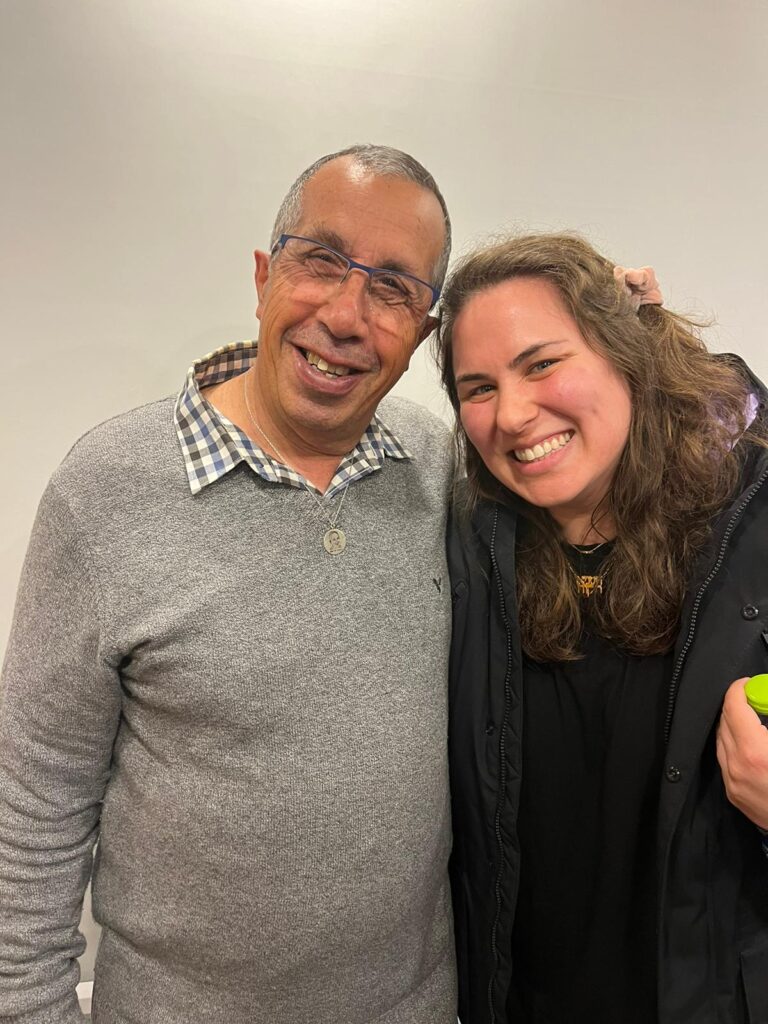
I was fortunate to be able to participate in the Bergen County Unity Mission last month. I wanted to volunteer, and to equip myself with accounts of what and where things happened on October 7, to be able to say that I saw these places with my own eyes.
We visited the Nova Festival grounds in Kibbutz Re’im, by the Gaza border, where Hamas terrorists murdered 364 people and took at least 40 hostages. It was painful to be there, to see pictures of the beautiful faces of those murdered and taken hostage. The grounds were perfect for camping, with lots of shade and flat spots to set up a tent, as many had done. We davened, prayed and cried.
It was horrible and meaningful and terrible and important all at the same time.
The Jewish People, klal Yisrael, is crying.
I asked questions and talked with whomever I could in Israel, about the war and October 7. After the mission ended, I struck up a conversation with a store owner at the Machane Yehuda shuk. He told me how his sister-in-law was paralyzed from the neck down several years ago in a terror attack in the Old City and that his friend Uriel Baruch is now a hostage in Gaza.
Klal Yisrael is bleeding.
We had the immense honor of hearing from Rachel Goldberg-Polin, Jon Polin and Rav Doron Perez, parents of hostages Hersh Goldberg-Polin and Daniel Perez respectively. I saw Rachel and Jon on Day 17 in New York and felt horrible that they had to still be doing this on Day 139. My tears flowed as they spoke. I was so in awe of how they held themselves, somehow “pretending to be human” as Rachel put it, while speaking to the public so eloquently, beseeching the governments of the world for something so achingly simple—to bring their son home. “Many people get hit with life-altering events” Rachel said, “and it’s like they were hit by a truck. Ours is life-altering too, but the truck is still on top of us.”
Klal Yisrael is in pain.

Rachel spoke of Hersh’s incredible display of respect for her and Jon. Hersh had told his parents he wouldn’t be keeping Shabbat the way that they do, but that he always goes with his father to shul so that he won’t sit alone in the men’s section. She quoted the pasuk, verse, which tells us of the commandment of honoring one’s father and mother, “כַּבֵּ֥ד אֶת־אָבִ֖יךָ וְאֶת־אִמֶּ֑ךָ” and said how we often tell children to remember the first part, but that the pasuk continues, “לְמַ֙עַן֙ יַאֲרִכ֣וּן”… “‘in order that you will live a long life in the land that God has given you.’” She spoke in a hushed, resolute tone, with a subtle smile, “and that’s how we know he’s coming back.”
“Because Hersh has a long life to live, because of the kavod, honor, that he has given us always.” She continued, “And even that day … the last communication we had with him was him saying ‘I’m sorry’ because he knew that we were going to be in a lot of pain, and he felt bad.” Rachel was referring to the last two text messages Hersh sent his family during the attack on the Nova festival, where he was: “I love you” and “I’m sorry.”
Jon spoke of what we can do to help. I hugged Rachel and told them that we are walking every week for the hostages and davening and calling our officials. Jon thanked me and said, “Please don’t stop.”
Klal Yisrael is not stopping.

Jen Airley came to speak to us about her son Binyamin, HY”D (Hashem yikom damo, may God avenge his blood), who was killed in Gaza. She told us stories about him—a mischievous kid, funny and deeply loving with a devotion to the Jewish people and the land of Israel. I asked, “How do you hold it all? How do we hold it all? The pain of the soldiers, hostages and Israel?” She said that we are Jews, we cry when we cry and we laugh when we laugh.
Klal Yisrael is holding many emotions at once.
We visited an army base and had an unbelievable night, dancing with the soldiers. We heard Rav Rimon speak, ate a delicious barbeque and celebrated the heroes of our time.
Klal Yisrael is dancing.
I had the honor of spending Shabbat with a family whose father just returned from the reserves after four months. They know there’s a chance that he’ll have to leave again. They know others who didn’t get their Abba back, and they are grateful for this gift. After months of waiting, worrying and missing him, the mother and her children felt joy and excitement—he was home.
Klal Yisrael is joyful.
We went to the Ichilov Hospital to visit wounded soldiers and met a young woman who survived the Nova festival massacre. She was shot several times and her boyfriend was killed beside her as they tried to escape by car. She waited six hours for help. She was happy to see us and hug us.
Klal Yisrael is hugging.
I expected this trip to have hard moments; the inspirational ones, however, surprised me.
On the last night of our mission Jacqui and Yaron Vital spoke to us about their daughter Adi Vital-Kaploun, HY”D. These two parents haven’t left my mind since. Yaron had been staying in a guest house near Adi’s home for Shabbat in Holit, a southern kibbutz, on the morning of October 7. When the rockets started, she insisted he stay there, no matter how much he protested. This, he said, was the first of several miracles that saved his life that day. Adi, only 33, died nobly defending her children. Her husband was out and she urged him not to come back. She showed tremendous strength and managed to kill one terrorist but was ultimately shot to death in front of her two sons: 4-month-old Eshel and 4-year-old Negev.
Klal Yisrael is strong.
Yaron spent 11 hours alone. When the IDF came, they protected him from the continuous gunfire as he approached Adi’s home. He opened the door to the safe room, but Adi was nowhere to be found. Her body was discovered days later under the bed in the safe room, which was heavily booby trapped by the terrorists. It was a fluke that the room didn’t explode when he opened that door. Another miracle, Yaron and Jacqui said.
The children, Eshel and Negev, were taken by terrorists but then miraculously released as part of a publicity stunt. Deceivingly portrayed by Hamas as their mother, the family’s neighbor Avital Aldjem was released with them after she and the boys were used as human shields and marched into Gaza. She was only alive because of the selfless act of her neighbor, Hayim Katsman, 32, who had come to her aid under gunfire. They hid in a closet and he absorbed all of the bullets, saving her life while losing his own.
Four-year-old Negev, shot in the foot by the terrorists, struggled on the long walk back to Holit with Aldjem, who held his baby brother. She promised Negev two apples if he kept going. Despite the frightening chaos when they finally arrived, the boy said, “You promised me apples!”
Klal Yisrael is resilient.

Yaron spoke as if he hadn’t just experienced the worst thing in his life. There are bad people in the world but many more good people, he said, and we need to choose life.
Upon my request, he gave me a heartfelt bracha, blessing, and tears welled up in my eyes—this was a very special person. He gave marriage advice, citing his 44-year marriage with his wife, and smiled a lot. He reminded me of my Zayde, a”h, a Holocaust survivor who had a great sense of humor. It gives him strength, he said, to be with people and share the story of Adi, his daughter, the lioness. I have their email and hope to stay in touch.
Who is klal Yisrael?
Klal Yisrael is a family.
Am Yisrael Chai.
Julie Wasserman is a first-grade teacher in the New York City public school system. She also sings and plays music for children and families at birthday parties and events. She holds master’s degrees in early childhood education from Bank Street College and social work from Fordham University. Julie co-leads the Run for Their Lives chapter (a weekly walk to raise awareness for the hostages) in Teaneck with her sister, Abbie Adamit. Most importantly, Julie loves her family very much and deeply appreciates her parents, Harvey and Susan, for always supporting her in her life endeavors.








